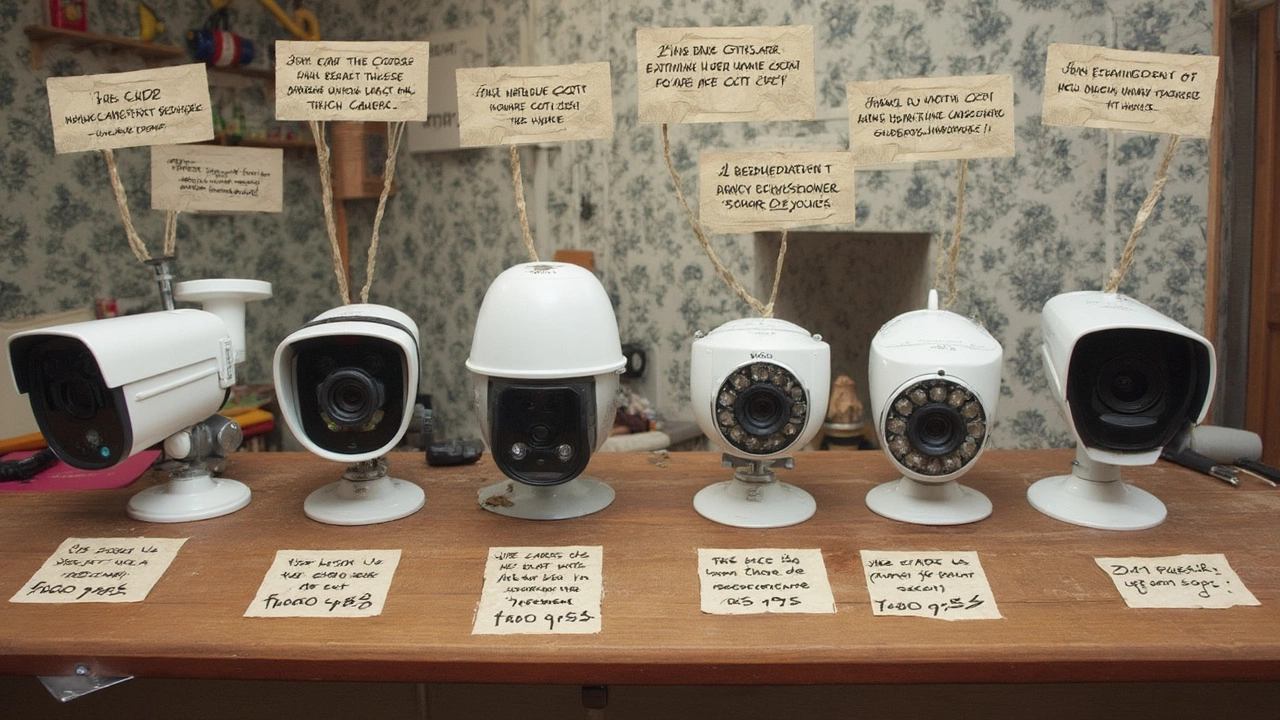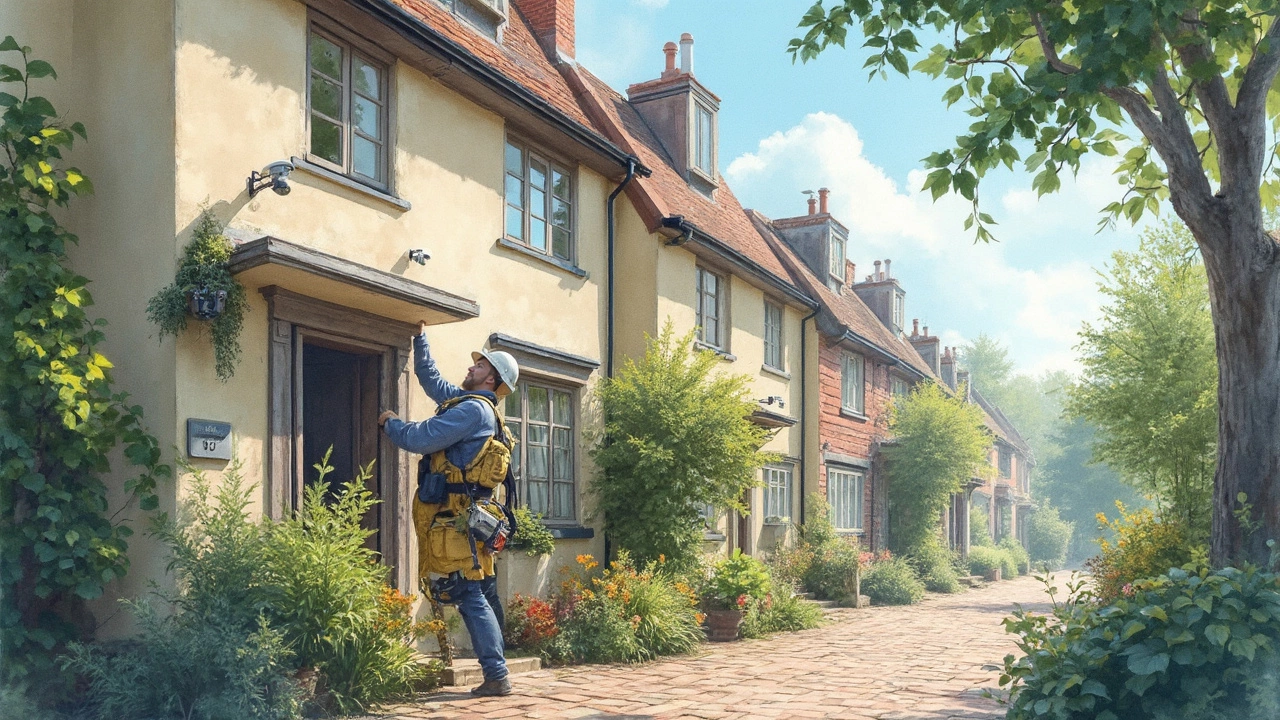So you're thinking about installing CCTV cameras, and suddenly, the big question pops up: Can an electrician help with that? The short answer is: Yes, mostly. Many electricians have the expertise to install CCTV systems, especially if they’re familiar with home security setups.
Let's dive right into it—why choose an electrician? Well, it’s not just about circuit boards and wiring. Electricians bring a depth of understanding about electrical systems that can be super handy when it comes to fitting CCTV. They've got the skills to safely connect and power up your cameras, ensuring everything runs smoothly.
CCTV installation isn't just plug-and-play. It involves mounting cameras, running cables through walls, ceilings, or attics, and connecting everything to a central system. That's why bringing in someone who knows their way around a toolbox can save you time, maybe even a bit of stress.
But how much will it cost you? Prices can vary widely based on several factors like the number of cameras, the complexity of installation, and your location. On average, you might be looking at a few hundred bucks, but getting an exact quote from a couple of pros will give you a clearer picture.
- Can Electricians Install CCTV?
- Understanding Installation Costs
- Benefits of Hiring an Electrician
- Tips for a Successful Installation
Can Electricians Install CCTV?
You might be curious: Can your friendly neighborhood electrician handle CCTV installation? In many cases, the answer is absolutely. Electricians, especially those who specialize in home and business security systems, are well-equipped to deal with this task.
Training and Skills
Electricians often complete specific training on security systems, including CCTV. They know how to handle all the wiring, mounting, and configuration needed to get your security system up and running.
Moreover, knowledge about the electrical grid ensures that the camera system is integrated seamlessly into your existing setup. This helps avoid overloading circuits and ensures that your system runs efficiently.
Licensing and Regulations
One thing to be mindful of is licensing. In some regions, electricians must hold specific licenses to install CCTV systems legally. It’s always a good idea to ask for their credentials when hiring an electrician for such a task.
Experience Matters
Experienced electricians bring the added benefit of problem-solving skills. If your property presents challenges, like complex architecture or inconvenient power access, they’ll know how to adapt. This could mean the difference between a quick and painless installation or a drawn-out hassle.
When You Might Need a Specialist
While many electricians are capable, highly advanced CCTV systems might need a security specialist. If you’re installing a complex system with multiple integrations, someone with niche expertise might be necessary. However, for most standard home and business needs, an electrician is more than qualified.
In conclusion, if you're considering a security upgrade, calling an electrician could be a smart move. Just make sure they’re appropriately qualified for the task. And hey, they could probably fix that flickering kitchen light while they're at it!
Understanding Installation Costs
Alright, let's break this down – what exactly are we paying for when we hire an electrician to install CCTV cameras? It's not just the CCTV installation itself but the expertise and the assurance that your system will run smoothly without any hiccups.
Factors Affecting Cost
The cost structure can be diverse and several factors influence it:
- Number of Cameras: More cameras usually mean higher costs because of the time and labor involved.
- Type of Cameras: Whether it’s a basic dome camera or a high-end PTZ (pan-tilt-zoom) camera, the prices can vary significantly.
- Installation Complexity: If your setup requires a lot of wiring through walls or ceilings, prepare for a higher bill.
- Location: Urban areas might have higher service charges compared to rural locales due to differing overhead costs.
Average Cost Breakdown
On average, you might be looking at spending around $100 to $250 per camera for CCTV installation, depending on the factors we just mentioned. This amount typically covers mounting, wiring, and connecting the system. Here's how it might stack up:
| Item | Estimated Cost |
|---|---|
| Basic Camera Installation | $100 |
| Advanced Camera Setup | $250 |
| Consultation Fee | $50-100 |
| Home Security System Integration | $150-300 |
Remember, these are ballpark figures. Getting a few quotes from local electricians will give you a more accurate estimate for your project.
Finding a Good Deal
To get the best bang for your buck, here are a few tips:
- Compare multiple quotes to score a fair price.
- Look for bundled deals that might offer a discount on multiple camera installations.
- Ask about any warranties or guarantees on the work done. Trust me, this could save you some headaches down the line.
In the end, it's all about getting value. Paying a bit more for quality service can ensure that your security systems function without a hitch, and that's definitely worth it.

Benefits of Hiring an Electrician
When it comes to setting up your CCTV system, there are some pretty good reasons to call in an electrician. First off, their deep knowledge of electrical systems allows them to handle installations with precision and care, which is exactly what you’ll want for keeping your security system up and running smoothly.
Expertise and Safety
Electricians are trained to manage the complexities of electrical systems safely. This means you get an installation that's not only spot-on but also meets all the necessary safety standards. For anyone concerned about wiring hazards or electrical faults, hiring a pro takes a load off your mind.
According to the National Electrical Contractors Association, "Hiring a certified electrician ensures that every aspect of your electrical system, including security additions like CCTV, is up to code and reliable." It's about knowing that your home or business is in skilled hands.
Time and Cost-Effectiveness
Though you might be tempted to cut costs with a DIY approach, think about the potential headaches down the road. An electrician can get the job done efficiently, sparing you the frustrations of troubleshooting or, worse, a malfunction after all your hard work. Plus, they can often snag discounts on materials, which helps keep costs manageable.
Integrated System Solutions
Beyond basic installations, electricians often have the skills to integrate your CCTV with other home or business systems, like alarms and lighting. This results in a more seamless and effective security solution.
Technical Support and Maintenance
Technical issues might crop up at some point or another, and having professional support on standby can save the day. Electricians typically offer maintenance services, ensuring your system doesn't just work when it's new, but stays reliable for years.
- In-depth knowledge of electrical systems
- Ensures safety and compliance
- Saves time and potential future costs
- Potential discounts on materials
- Offers integration with other systems
- Includes ongoing technical support
Tips for a Successful Installation
Getting your CCTV installed just right can make all the difference in how well your system works. Here are some practical tips to ensure your installation goes off without a hitch:
Plan Your Camera Placement
Before you start drilling holes, think about where you want those CCTV cameras. Consider entry points like doors and windows, but don't forget about blind spots like driveways or backyards. A little planning goes a long way in ensuring comprehensive coverage.
Quality Over Quantity
It's tempting to think more cameras mean better security, but that's not always the case. Invest in fewer, high-quality cameras that offer clear footage even in low light. You won't regret having top-notch visuals when you need them most.
Get the Cabling Right
One common hiccup is messy or exposed cables. Keep them tidy and concealed to prevent tampering and keep things looking neat. An electrician can help run these wires through walls or use conduits, making the setup more robust and secure.
Optimize Camera Angles
A small angle adjustment can make a huge difference in coverage. Make sure the field of view is wide enough to capture large areas but focused enough to capture the details that matter.
Consider Storage Options
Don't overlook where your footage will go. Will you use a cloud service or local storage? Having a backup ensures that your recordings are secure and accessible when you need them.
Test the System
Last but definitely not least, test everything! Check that the cameras capture the desired areas and test the night vision or motion detection features. Early troubleshooting can save you a ton of hassle later on.
If you're unsure about any step, don't hesitate to consult a professional. After all, your peace of mind is worth it!

